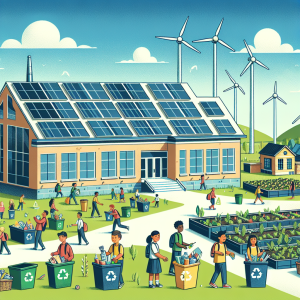Understanding the Environmental Impact of Off-Grid Living
Off-grid living, characterized by a self-sustained lifestyle free from reliance on public utilities, has gained traction in recent years. Increasingly, individuals and communities are opting for off-grid living due to rising utility costs, technological advancements, and a desire for a more sustainable lifestyle. However, it’s crucial to understand the environmental impact of this way of living.
One significant aspect of off-grid living is energy consumption. Many off-grid residences utilize renewable energy sources such as solar, wind, or hydroelectric systems. Solar power is the most popular choice due to decreasing costs and technological improvements in solar panel efficiency. A solar-powered home typically consists of photovoltaic panels, batteries for energy storage, and an inverter system. Properly designed, these systems can significantly reduce reliance on fossil fuels, decreasing carbon dioxide emissions and contributing to slowing climate change. However, the production and disposal of solar panels and batteries have an environmental footprint, although technological advances are making these processes less impactful.
Wind turbines offer another viable option, particularly in areas with consistent wind patterns. Compared to solar panels, they often require less land use, making them a more efficient choice for certain environments. Small-scale hydroelectric power is suitable in areas with access to flowing water. While these systems can provide reliable, clean energy, their installation often requires substantial initial investment and a thorough analysis of local environmental impacts to avoid disrupting local ecosystems and water flow.
Waste management is another critical aspect of off-grid living, influencing environmental impact. Conventional waste disposal methods involve regular trash collection and processing systems. In contrast, off-grid homes frequently rely on composting toilets and alternative waste systems. Composting toilets convert human waste into compost over time, reducing water consumption and chemical use found in traditional septic systems. Properly managed, these systems can be a sustainable solution. Additionally, utilizing recycle and reuse principles minimizes overall waste production, highlighting the importance of recycling and conscientious purchasing choices to lessen environmental burden.
Water usage and conservation present another avenue for examining the environmental impact of off-grid living. Off-grid inhabitants often collect and purify rainwater, which reduces dependency on municipal water supplies. Using rainwater harvesting systems, which include tanks, filters, and pumps, residents can sustainably manage water use. Implementing greywater recycling further boosts water efficiency by enabling water from sinks and showers to be repurposed for irrigation or toilet flushing. Maintaining these systems and ensuring proper filtration and purification practices are vital to prevent contamination and ensure safety. While these practices dramatically cut water consumption, mismanagement can lead to pathogen exposure, highlighting the need for diligent system upkeep.
Food production and consumption also factor into the environmental dynamics of off-grid living. Many off-grid communities strive for food self-sufficiency through permaculture, organic gardening, and small-scale animal husbandry. By growing their own food, residents can avoid the environmental costs of large-scale agriculture, including pesticide use and soil degradation. Permaculture principles, which emphasize sustainable and self-sufficient agricultural ecosystems, lead to improved soil health and biodiversity. Yet, managing such systems requires knowledge and consistent effort, and initial setup can disrupt local habitats if not carefully planned.
Transportation is a frequently overlooked element of off-grid living that bears environmental consideration. Living in remote areas often necessitates longer distances to access goods and services, potentially increasing fossil fuel consumption if vehicles are the sole mode of transport. Sustainable practices such as carpooling, utilizing electric vehicles, or investing in e-bikes can mitigate these impacts. Additionally, remote work opportunities, which have expanded due to improving internet connectivity and changing work cultures, can reduce commuting requirements and associated emissions.
The ecological footprint of construction methods and materials used in off-grid homes is another influential factor. Many off-grid enthusiasts turn to eco-friendly building materials such as straw bales, rammed earth, or reclaimed wood. Such materials often provide better insulation, reducing the need for heating and cooling. Furthermore, passive solar design, which optimizes the sun’s thermal energy, can considerably diminish energy usage. Though beneficial, unconventional building practices may encounter regulatory hurdles or require expertise to ensure compliance with structural and safety requirements.
In considering the environmental impact of off-grid living, the location plays a pivotal role. The geographic and climatic conditions dictate suitable renewable energy sources and influence waste management, water usage, and food production capabilities. Thoughtful site selection can enhance ecological sustainability and minimize interference with local ecosystems.
Ultimately, the sustainability of off-grid living is a balancing act that necessitates careful planning, responsible resource management, and a persistent commitment to minimizing environmental impact. Through mindful practice, off-grid living holds potential for reducing ecological footprints while embodying the principles of sustainability and self-reliance.




